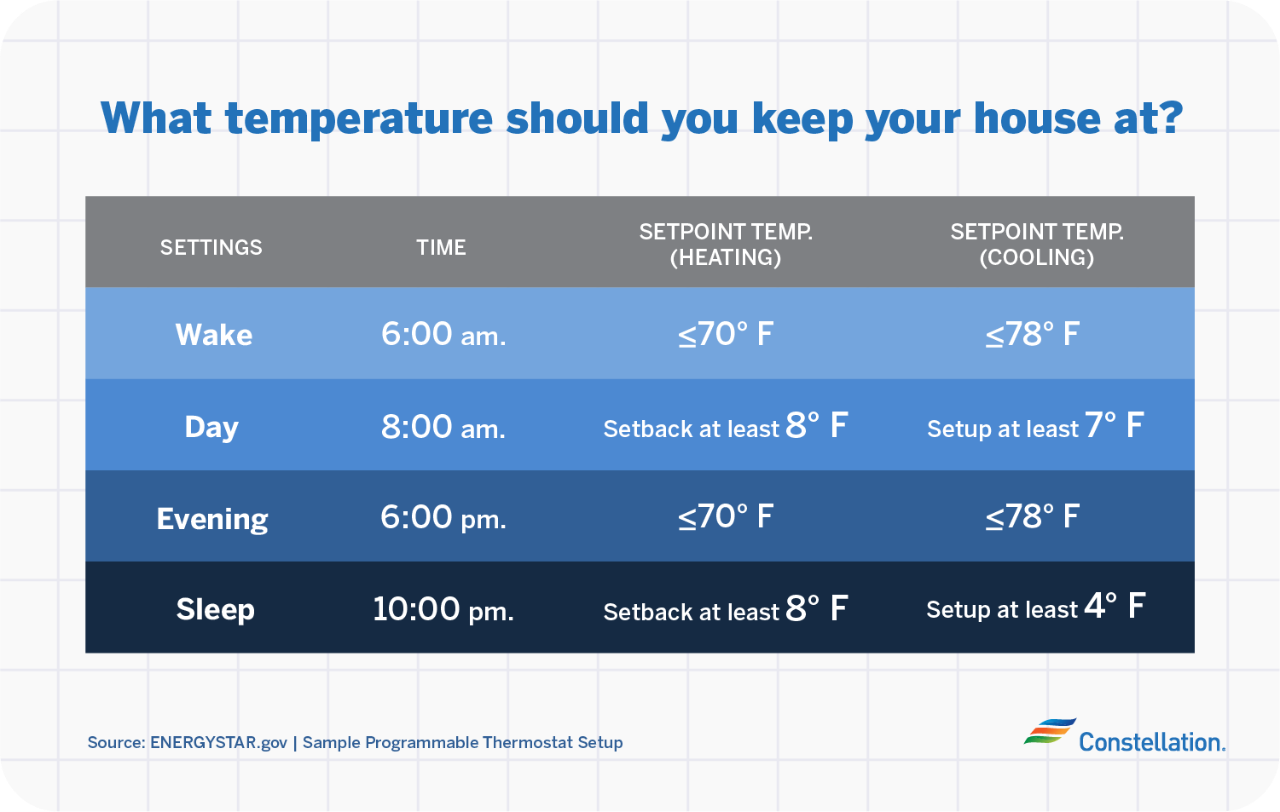What Temperature Should A House Be In The Winter – is the article you’re searching for. Hopefully, you can find information related to What Temperature Should A House Be In The Winter here, all of which we’ve summarized from various reliable sources.

**Finding the Ideal Winter Temperature for Your Home: A Comprehensive Guide**
As the winter chill sets in, maintaining a comfortable temperature within our homes becomes a paramount concern. Finding the optimal balance between warmth and energy efficiency can be a delicate task, but with careful consideration and a few simple tips, you can create a cozy and inviting indoor environment without breaking the bank.
The ideal winter temperature for a home is generally between 68°F (20°C) and 72°F (22°C). However, personal preferences and factors such as humidity, activity level, and clothing insulation can influence this range. To achieve the most comfortable and energy-efficient temperature setting, consider the following factors:
**Defining Thermal Comfort**
Thermal comfort refers to the state of contentment with the surrounding thermal environment. It encompasses factors such as temperature, humidity, and air movement, which together influence our perception of warmth or cold.
The human body maintains a core temperature of approximately 98.6°F (37°C) and relies on various mechanisms to regulate its internal temperature. When the ambient temperature is higher than the body temperature, the body sweats to cool down; when it’s lower, the body shivers to generate heat. Achieving thermal comfort ensures that the body’s temperature regulation mechanisms are not overly stressed, leading to a sense of well-being and productivity.
**Factors Influencing Indoor Temperature**
Several factors can affect the indoor temperature of your home, including:
- Outdoor temperature: The outside temperature is a major determinant of indoor temperature, especially if your home is not well-insulated.
- Insulation: Adequate insulation in walls, ceilings, and floors helps prevent heat loss and maintains a stable indoor temperature.
- Windows and doors: Unsealed windows and doors can allow drafts and cold air to enter, affecting the indoor temperature.
- Heating system: The type and efficiency of your heating system will impact the indoor temperature you can achieve.
- Activity level: Physical activity generates body heat, which can make you feel warmer at lower temperatures.
- Clothing insulation: Wearing warm clothing can help you retain body heat and feel comfortable at lower indoor temperatures.
**Latest Trends and Developments**
Emerging trends and advancements in home heating and insulation technologies are shaping how we maintain comfortable indoor temperatures:
- Smart thermostats: These devices allow you to control your heating system remotely and program it to adjust temperatures based on your schedule and preferences, optimizing energy efficiency.
- Energy-efficient windows and doors: Modern windows and doors are designed with multiple panes, gas fills, and advanced glazing technologies to minimize heat loss and improve insulation.
- Radiant heating systems: These systems distribute heat evenly throughout the floor or walls, providing a comfortable and energy-saving alternative to traditional forced-air heating.
- Home energy audits: Professional audits can identify areas of heat loss in your home and recommend improvements to enhance energy efficiency and indoor comfort.
**Tips for Maintaining an Ideal Winter Temperature**
Follow these expert tips to create a cozy and energy-efficient home environment:
- Dress warmly indoors: Layer your clothing and wear insulating fabrics to maintain your body temperature.
- Use curtains and blinds: Keep curtains and blinds closed during the night to prevent heat loss through windows.
- Insulate your home: Seal any gaps or cracks around windows, doors, and pipes to prevent drafts.
- Consider a space heater: Supplement your central heating with a space heater in frequently used rooms for added warmth.
- Program your thermostat: Set your thermostat to lower the temperature when you are away or sleeping to save energy.
In addition to these tips, consult with an HVAC professional for personalized advice on optimizing your heating system and achieving the most comfortable and energy-efficient indoor temperature.
**Frequently Asked Questions (FAQs)**
- What is the recommended indoor temperature for winter?
Between 68°F (20°C) and 72°F (22°C), depending on personal preferences and other factors.
- How can I reduce my energy bills in winter?
Dress warmly, insulate your home, use curtains effectively, and program your thermostat to save energy.
- What should I do if my home feels drafty?
Check for gaps and cracks around windows, doors, and pipes and seal them to prevent heat loss.
- Is it better to use a space heater or central heating?
Space heaters can provide targeted warmth, but central heating is more energy-efficient for warming the entire home.
- How often should I have my heating system checked?
Once a year, ideally before the start of the winter season, to ensure optimal performance and energy efficiency.
**Conclusion**
Finding the ideal winter temperature for your home involves considering factors such as thermal comfort, insulation, and personal preferences. By implementing simple tips and embracing the latest trends in home heating technologies, you can create a cozy and energy-efficient indoor environment that keeps you comfortable all winter long.
Is finding the ideal winter temperature for your home a topic that interests you? Share your thoughts and experiences in the comments section below.

Image: www.cartercomfort.com
We express our gratitude for your visit to our site and for taking the time to read What Temperature Should A House Be In The Winter. We hope this article is beneficial for you.